Down But Not Out: Sierra Leone’s NTD Program Restarts Activities as the Ebola Threat Subsides
June 30th, 2015
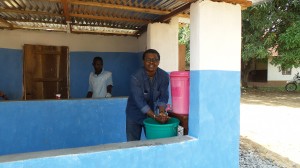
END in Africa Technical Advisor Dr. Joseph Koroma complies with mandatory handwashing before entering the District health compound in Bo, Sierra Leone. Photo: FHI360
It all started a year and a half ago in Guinea, West Africa, when in December 2013, the country reported several cases of the Ebola Virus Disease (EVD). By March 2014, the outbreak had spread to neighboring Liberia. In May, it reached also Sierra Leone, dealing a huge blow the country’s public health system, including its Neglected Tropical Diseases (NTD) program.
Sierra Leone is a poor West African country with poor health indicators. A decade earlier, a twelve-year civil war (1991-2002) had devastated the economy and almost brought the entire health care system to a standstill. Nevertheless, the country made progress in revamping its socio-economic situation after the war, and the outlook appeared optimistic. In the health arena, FHI 360 was in the forefront of assisting Sierra Leone in rebuilding its public health system. Through the USAID-funded END in Africa project, FHI 360 has supported a successful integrated NTD program since 2010 in Sierra Leone that targets 7 NTDs: lymphatic filariasis (LF), schistosomiasis (SCH), trachoma, onchocerciasis (oncho) and three soil-transmitted helminthes (STH).
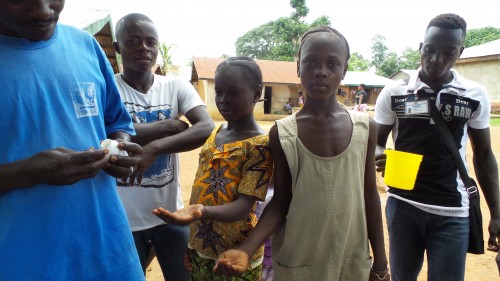
Children take preventive medicine to protect themselves against NTDs during the 2015 mass drug administration in Sierra Leone. Photo: FHI360
Shortly after the EVD outbreak began in Sierra Leone, all public health program activities were suspended in the country, including those involving NTDs. Consequently, the NTD Program (NTDP) was unable to provide any mass NTD treatments in Sierra Leone in 2014, as the EVD outbreak had spread to all 14 districts in the country, bringing the country to a virtual stand-still.
Almost an entire year passed before the NTDP was able to resume mass NTD treatments. Even now, three of the country’s 14 districts (the Western Urban, Kambia and Port Loko districts) are still working toward containing the outbreak.[1] However, mass drug administration (MDA) for LF, Oncho, STH and SCH (baseline studies have shown that trachoma is not endemic in Sierra Leone) was successfully resumed in May 2015, on the heels of a recent nationwide malaria MDA and vaccination campaign.
Preparing for Sierra Leone’s 2015 NTD MDA
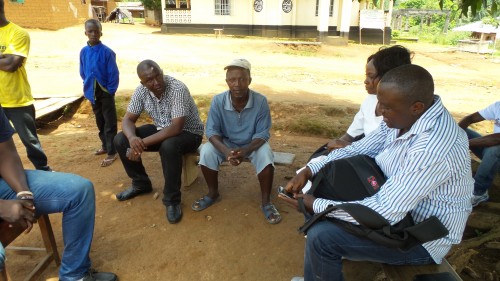
Members of Sierra Leone’s NTD Program and the END in Africa team meet with Komende Luyama Village Chief Musa Lahai (center) during the NTD MDA in his village. Photo: FHI360
After a year-long interruption in mass treatment, Sierra Leone’s national NTDP and Helen Keller International (HKI), END in Africa’s sub-grantee in Sierra Leone, carefully planned and carried out many preparatory activities prior to embarking on the country’s 2015 NTD MDA campaign. These included conducting:
- An NTD stakeholders meeting to plan the resumption of NTD activities in Sierra Leone (February 2015).
- A national refresher training session for trainers in the Bo district (March 7, 2015).
- A refresher training for peripheral health unit (PHU) district personnel (March 24 – April 4, 2015).
- Social mobilization through radio discussions and community meetings in every community targeted for treatment in 12 provincial districts (April 2015).
- Special advocacy and social mobilization meetings in the 3 districts that failed the last pre-transmission assessment surveys (pre-TAS) for LF conducted in 2013 (Koinadugu, Bombali and Kailahun districts). These meetings targeted paramount, section and village chiefs, people in the community, health workers and community volunteers such as community directed distributors (CDDs).
- Advocacy and social mobilization meetings led by the district health management teams (DHMTs) under the supervision of the NTDP and partner organizations in all 12 provincial districts (May 2015).
- Training for the CDDs, led by PHU staff supervised by DHMTs, the NTDP and partner organizations (May 2015).
Leading by Example to Regain Trust
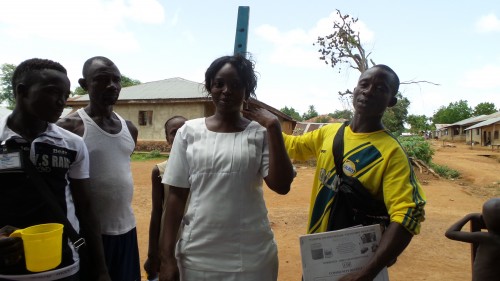
Measuring the District Health Sister of Kenema, Sierra Leone to determine the appropriate dosage of NTD medicine for her. Photo: FHI360
As the MDA was getting underway in late May 2015, END in Africa Technical Advisor (TA) Dr. Joseph Koroma visited the community of Komende Luyama in the Kenema district, which was conducting MDA for LF, oncho and STH.
“The MDA in Komende Luyama was just getting started on the day of my visit,” Dr. Koroma said. “Only after Chief Musa Lahai, the village chief, and the village’s two community nurses took the NTD treatment, would the people in the community consent to taking the treatment themselves.” He added that three members of the district health team who had accompanied him to the village, also took the NTD treatment in front of community members to further convince people to take the treatment.
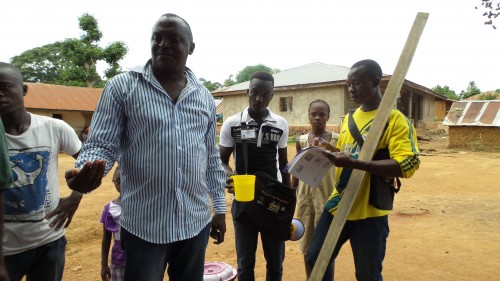
The Kenema District NTD Focal Point taking his NTD treatment in front of community members in Komende Luyama, Sierra Leone. Photo: FHI360
“END in Africa will continue to support HKI and the national NTDP in the process of reestablishing NTD program activities in Sierra Leone, so that the effect of the EVD on NTD control and elimination efforts will be minimal,” he said. While there’s a clear need for special social mobilization in order to convince community members to take the NTD treatment, given the country’s terrible experience with EVD, early indications are that Sierra Leone’s 2015 MDA will ultimately be considered a success.
[1]Sierra Leone cannot be declared EVD-free until every health district in the country has no new cases for at least 42 consecutive days. According to the MOH EVD situation report of June 17, 2015, 11 of Sierra Leone’s 14 health districts have not reported any new EVD cases in the past 42 days or longer. They include: Pujehun and Kailahun, with no new cases for over 6 months; Bonthe and Bo, with no new cases for over 5 months; Kenema, Kono, Tonkolili and Moyamba, with no new cases for over 3 months; and Bombali, Koinadugu and Western Rural, with no new cases in 81, 60 and 55 days, respectively. Three districts still intermittently report new EVD cases (1-3 per day): Western Urban district has gone 18 days without a new case, but Kambia and Port Loko each had 1 new confirmed case during reporting period.

